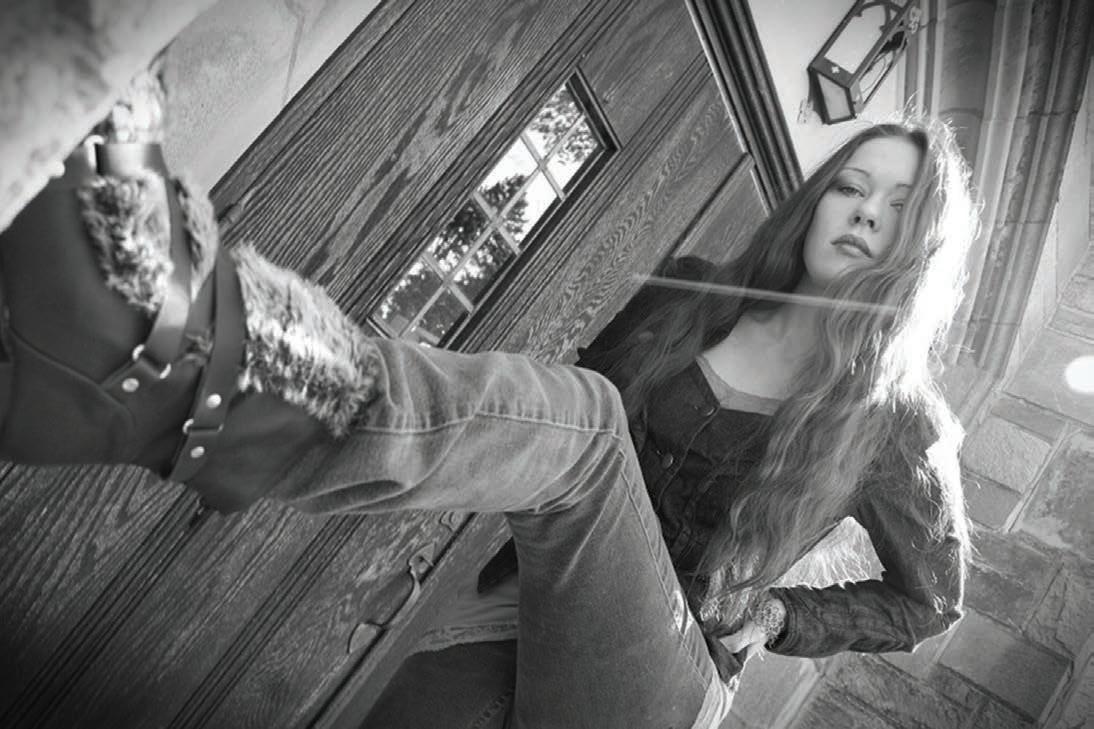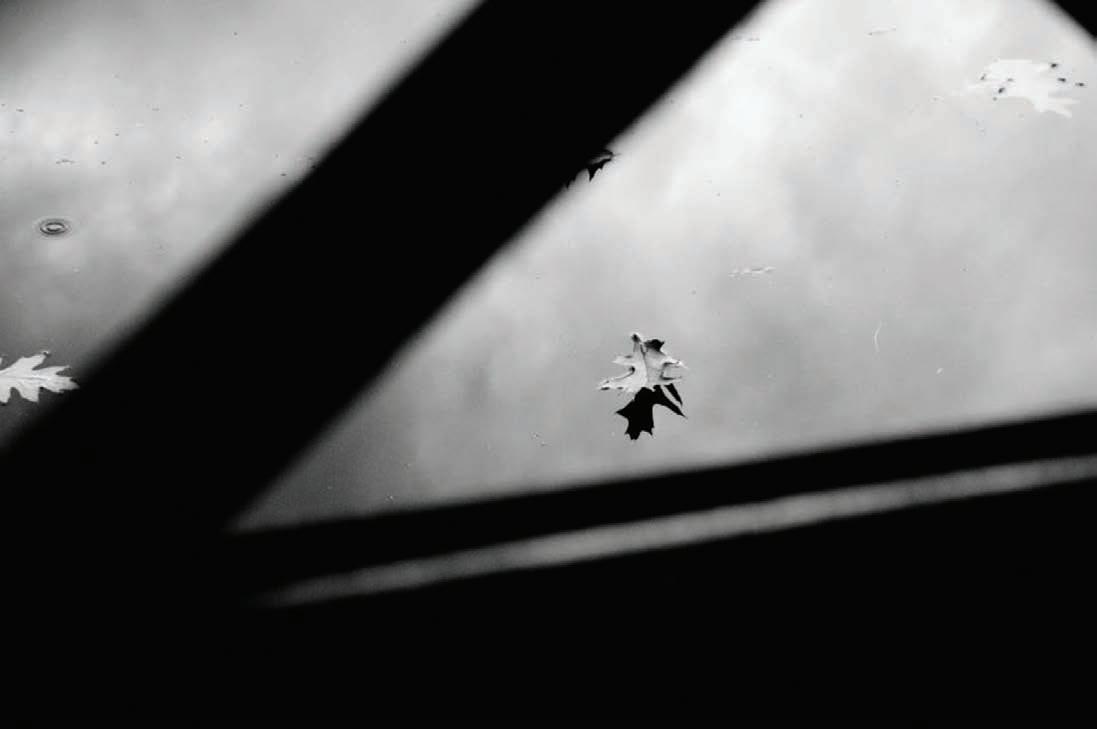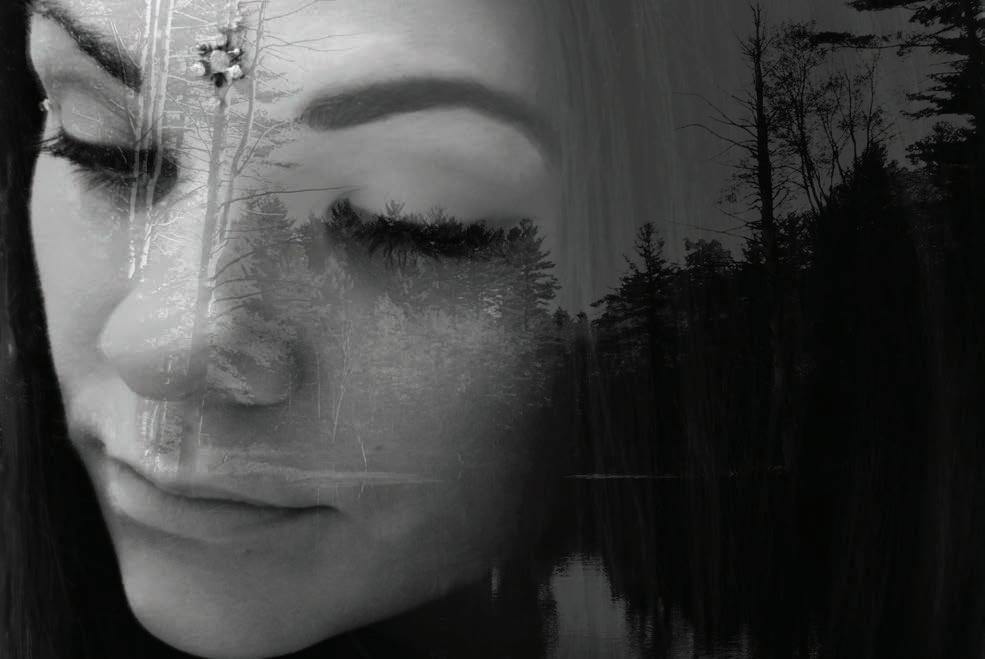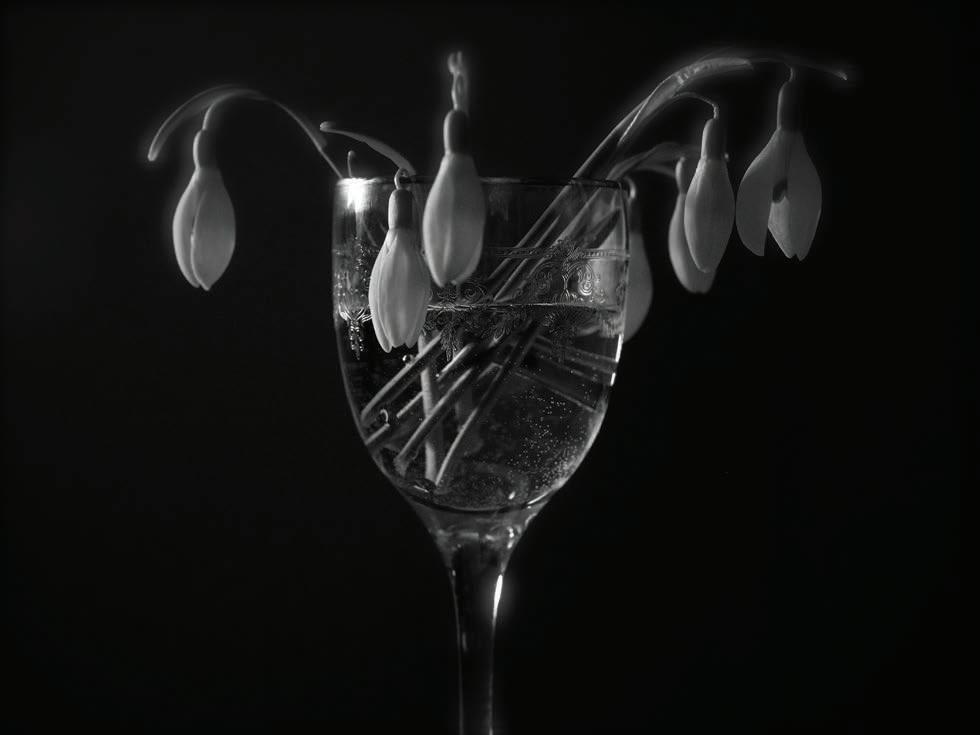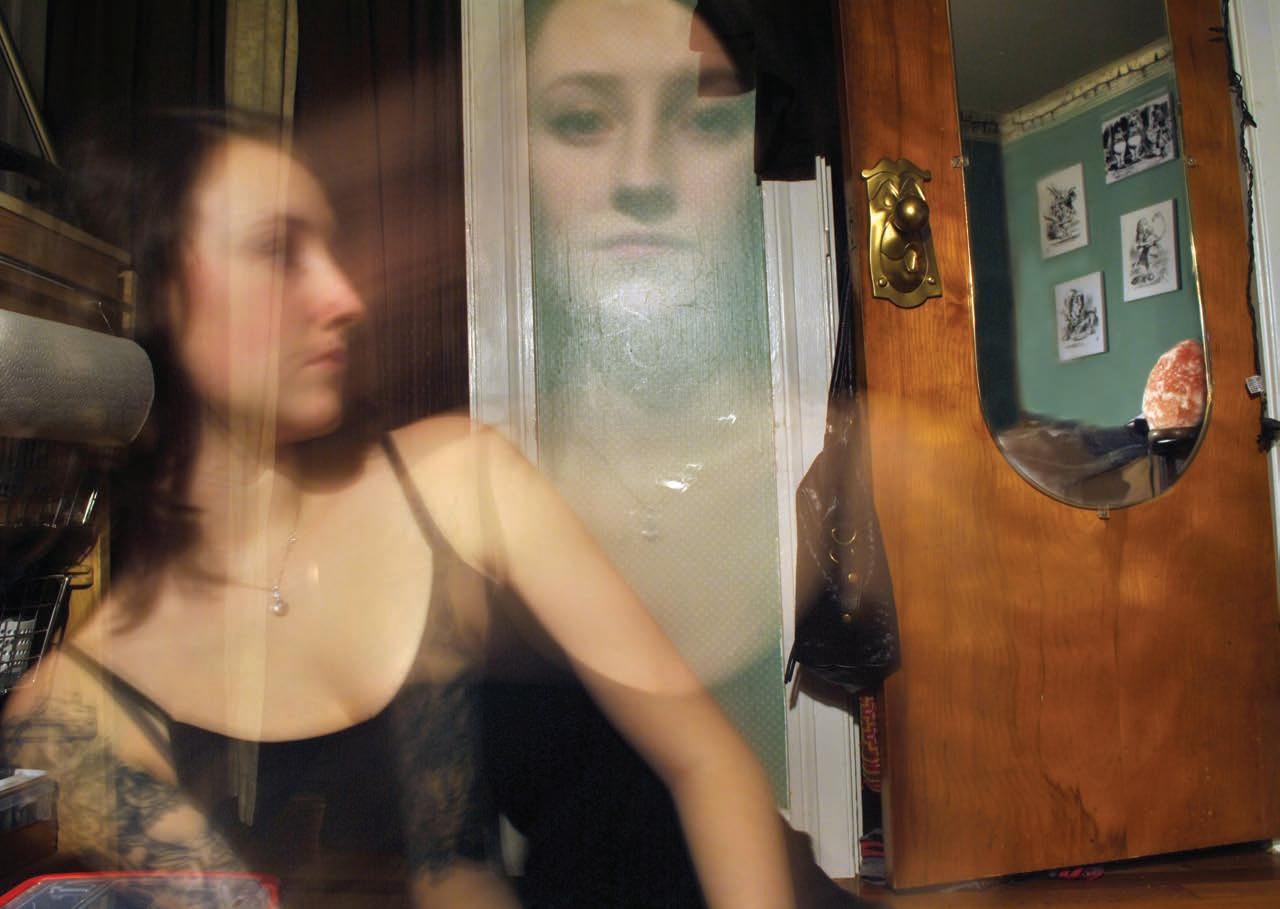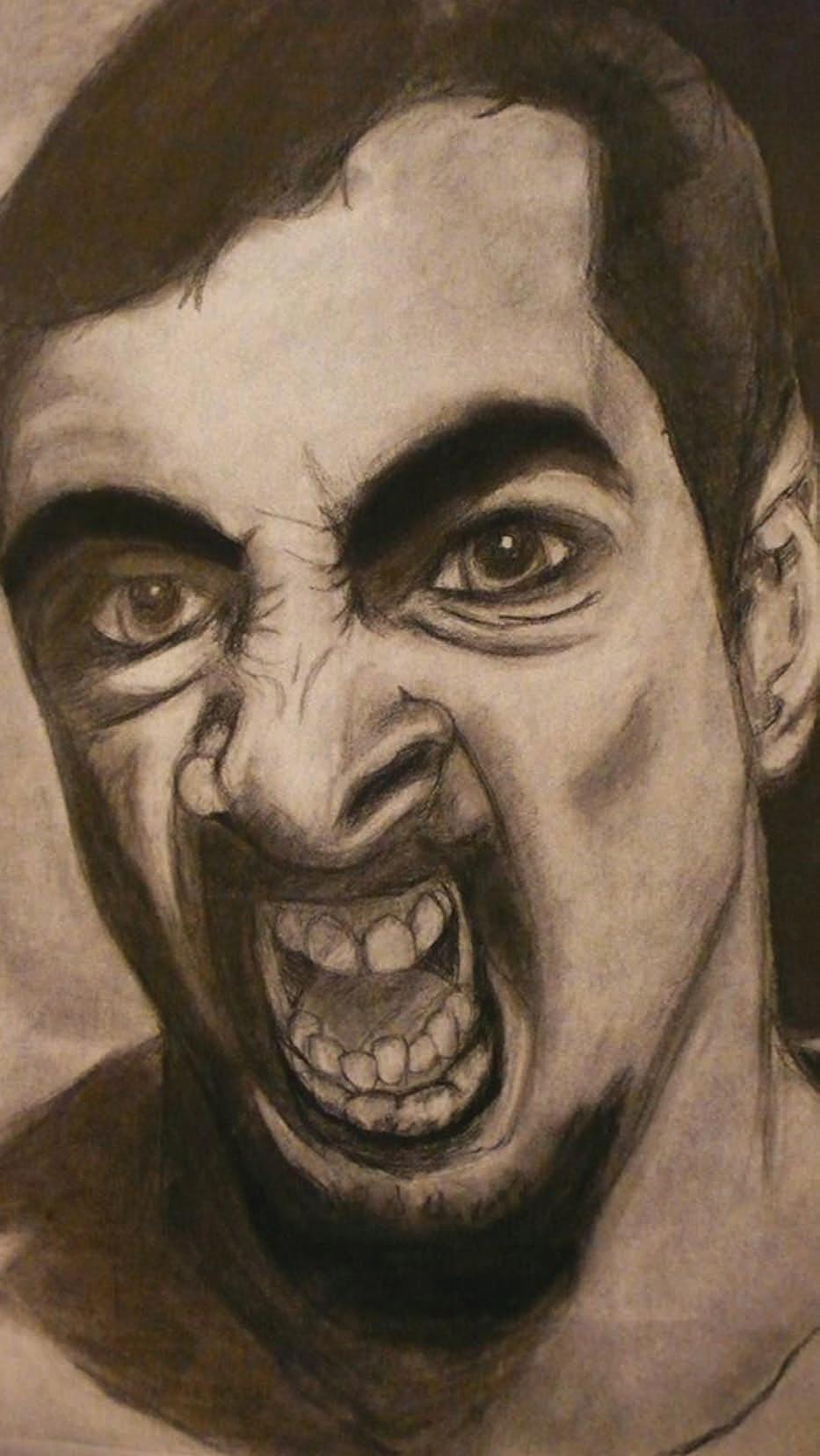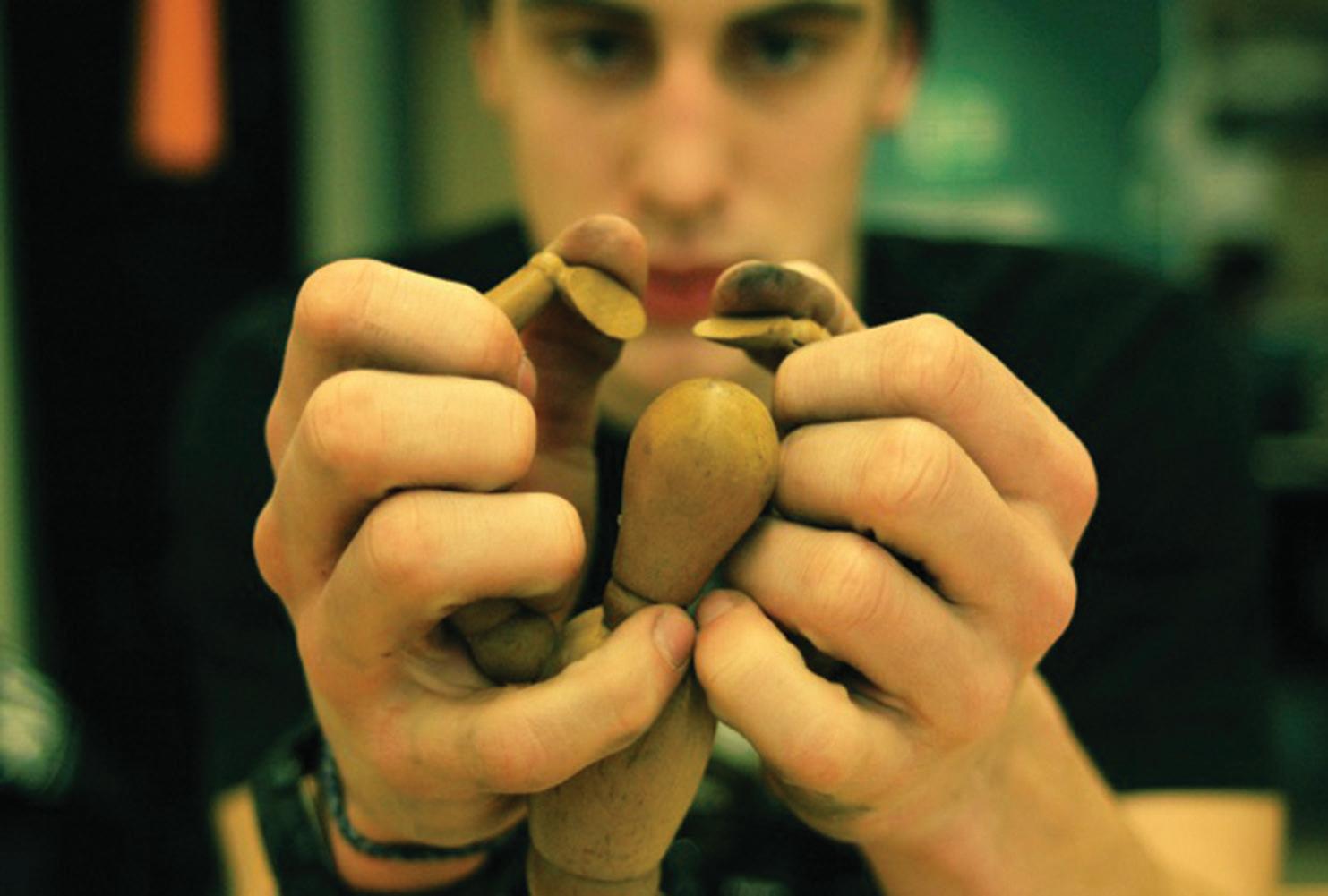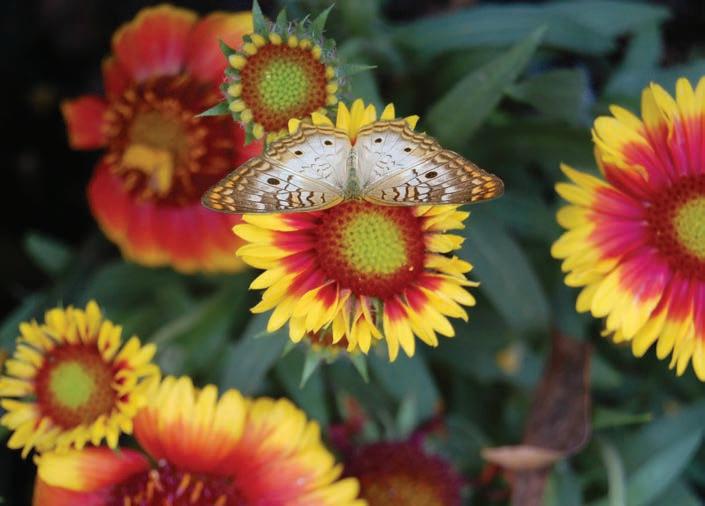three p r etty po ems e mma b ogan
I want to write a pretty poem
About how much I miss you
And I want to use lovely phrases like “Too many years ago” and “rare green eyes”
And “the softest falling of night”
But I can’t
And I can’t because there’s nothing pretty about this
This is just pain
It’s not pretty or lovely or poetic
It just hurts
So I’m scribbling down this crap
Hoping that it helps, maybe
But it doesn’t
It can’t help because even if I read it to you
A slab of granite won’t answer
And the graveyard will still be silent
And you’ll still be gone
And this still won’t be beautiful.
There is a time somewhere before nightfall
When every childish question springs alive
And every answer is inadequate
And all my philosophies abandon me
I would turn to God
But no god has ever stooped to speaking with me
So I must be content with the mysteries of the universe as they stand
And lie amid the softest falling of night
Tormenting myself
Because I want to know
If heaven is dark
I always wanted to know what heaven was like
So I asked you over and over
“What if we get hungry?” and “What if we get bored?”
And you would smile at me
And you would look at me with those beautiful rare green eyes
And you would say
“God will take care of us”
It was never a satisfying answer
I remember that once I asked
“Is heaven dark?”
And I was thinking of the dim Catholic Church we went to
I was thinking of how much I hated that darkness, that silence, that strictness
You said you didn’t know
For years I would not enter a church without being coerced
I would sit stiff and uncomfortable and angry
And joke about how holy water might burn my skin off my bones
But you’re beyond dim, strict churches
(Even if you weren’t, the water wouldn’t burn you)
And now you know
While I’m still down here
Writing bad poetry
Wondering if you’re bored
30
31
First Facet: Love
“Forgive me father…”
T he boy told himself he had come to get help, to stop. He hoped to walk into this holy house and, under the forceful and loving eyes of God, make a resolution. He would control himself.
He would get clean. Cold turkey. That’s all there is to it, he told himself. With the Lord’s help he could be normal for once in his goddamned life. Amen.
He didn’t want to touch them anymore. Or hurt them. Or so he told himself.
W hat the boy really came for, of course, was reassurance. He didn’t know if he believed in Hell, not really, but he was sure scared of it. Scared of burning. Of pain. Of forever.
“Son?” the priest said in the wheezing voice of the very old, barely muf fl e d by the checkered panel separating the confessionals.
“Forgive me father,” the boy said, “I think… I think I’ve sinned. I think I’m going to Hell.”
“ Why would you think that, my son?”
“I’m not normal. I do… things… that aren’t normal. And I don’t think God likes the things I do.”
“What sort of things?” the priest asked, his voice just above a whisper.
For a moment the boy said nothing, and then for several minutes the church was silent save for the sounds of someone sobbing.
“Am I going to Hell, father? Please tell me,” the boy pleaded between wet gasps. “I really don’t think I’d like it there.”
“No,” the priest said, “I don’t suppose you would. I don’t suppose anyone would.”
“I don’t think God loves me.”
“I’m sorry?”
“I don’t feel God’s love,” the boy said. “I know my mom loves me. I can tell. It’s like I can feel it when she talks to me. But with God… I just don’t feel it.”
A pause.
“God’s love is… God’s love is a different kind of love,” the priest explained. “It’s colder, more distant. He has so many people to love that sometimes it feels like he we’re no more important than ants. But He loves you. God loves all his children. I’m sure of it.”
A longer pause.
“I’m sure of it.”
Second Facet: Duality
Some people believe there is an angel on one shoulder and a devil on the other. These people are wrong.
T here is only one Devil, and he is far too busy to make house calls over the fate of one measly soul. So please, for the love of God, stop using him to justify your actions.
Third Facet: The Pit
Well below the Earth, and below space, and below the space between space there is a pit.
A t the bottom of the pit is a creature more dark and twisted than the pit itself. The creature is horrid; the creature is hated.
I t has one long horn that stretches far above its bull-like head and another that is broken just above his skull. Its teeth are long and sharp and a yellow-brown color not unlike rotting fruit, and a thick, black liquid constantly dribbles down from its jowls. Its eyes are darker than the pit, and some say that they are pits in themselves. Do not look into its eyes.
I t is very cold in the pit.
M any ask where the creature came from. They ask how long it’s been down there. They ask why it’s so ugly.
But they never ask if the creature has always looked this way.
Fourth Facet: The Light
“I was beautiful once. The most beautiful in all creation. I had a different name then, and wings of the purest white feathers you’d ever seen.”
Fifth Facet: Magic “Hold the gate! Don’t break rank you bastards!” the commander bellowed from the castle ramparts.
T he soldier, along with a hundred others, had the hard job. The job for the strong men, the proven men. The job for those
veterans who had chosen the life of warring and whoring over the one of living and loving. The soldier was young. The soldier was green. The soldier did not belong.
But here the soldier was all the same, ready to defend himself. Ready to prove himself. Ready to shit himself. He had the hard job: he had to hold the gate.
“Listen men!” the commander shouted from above, from another world it seemed to the soldier. “These cretins, these traitors, these heretics would come and take all that is left holy in this world. All that is left sacred. All that they have not tainted with their foul magicks.
“ They come with force. They come with fir e. They come with demons at their backs and Satan by their sides.
“But we serve under the Lord, and we will protect this ground. His ground. So I say to you one final time brothers of the Blood, hold the gate!”
A s booming cheers went up with the rising dawn around him, the soldier felt like shrinking back into his armor. Retreating into the safety of his house, his bed, his mother’s arms. But he would not; he served under the Lord, and he would stand tall no matter what was thrown against him.
S o instead of holding onto the fear roiling around in his gut, the soldier grasped on to a simple phrase: hold the gate.
He s aid it to himself when the battle over the hill and not-so-far away began with furious explosions and deathly screams that seemed to split the afternoon sky.
Hold the gate.
32 33
the teN faCets of the d evil’s looki N g g lass
Jake we isberg
When Hell’s wizards called forth fi r e and stone and lightning to rain down from the heavens, he held on to it.
Hold the gate.
W hen the sunset was overshadowed by the Devil’s magicians climbing the hill, wielding blue-green air that spun about them in webs or liquid fi r e that dripped through their fi ngers only to splash only the bare earth, he said it.
Hold the gate.
E ven when he fi nally was face-to-face with death, when the sorcerers’ magic danced under the light of the stars, destroying all around him, he stood tall. When the hardened veterans beside him slunk to the cold, wet grass like snails, the soldier puffed out his chest and held fi r m. God was with him, and he was God’s servant. God would not desert him.
A nd so the last thought the soldier had, just before the castle walls were pulled down on top of him by the arms of some invisible behemoth, was hold the line.
Sixth Facet: Sin
I knew he was a liar.
He s aid that we had to stop. He said he couldn’t see me anymore, and that I shouldn’t call him. He said he wasn’t going to tell his wife. He said that women were weaker, that she probably couldn’t take it, and that I should know.
Once he said he loved me, and I made love to him hard and fi erce. He said that it was just us. He said we could have the world, I just had to stick by him.
T he fool I am, I did. Even worse, I believed him.
He s aid he liked the obscure, out-of-the-way restaurants because the service was better. He said he didn’t want to go ice skating or shopping or dancing because he didn’t like crowds. He said why go to the theater when a movie in bed was so much more comfortable and intimate. He said he showered before sex because he wanted to be clean for me.
He s aid he went to church on Sunday mornings.
I k new he was a liar. Seventh Facet: The Fall
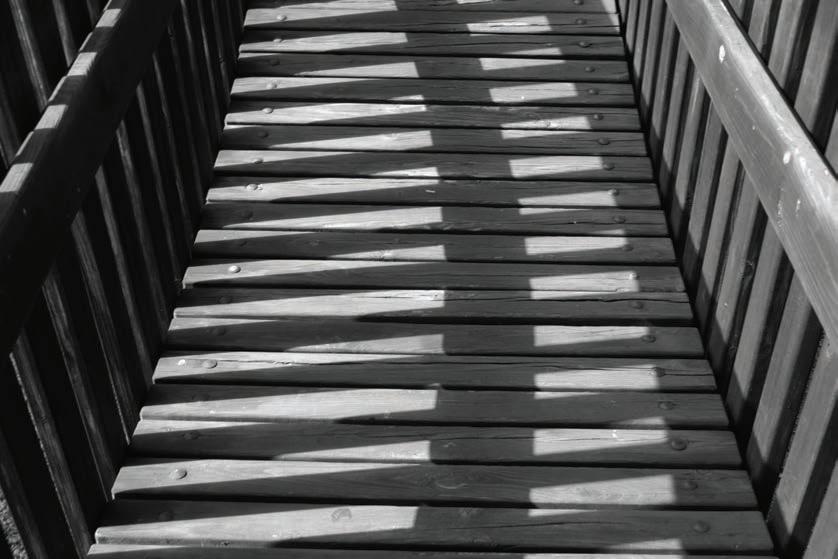
“I just wanted to know why. Why You made them in your image. Why You loved them best. Why we weren’t good enough for You.
“ Was that too much to ask? I thought it was only fair. After all, we were here fi r st.”
Eighth Facet: Zealot
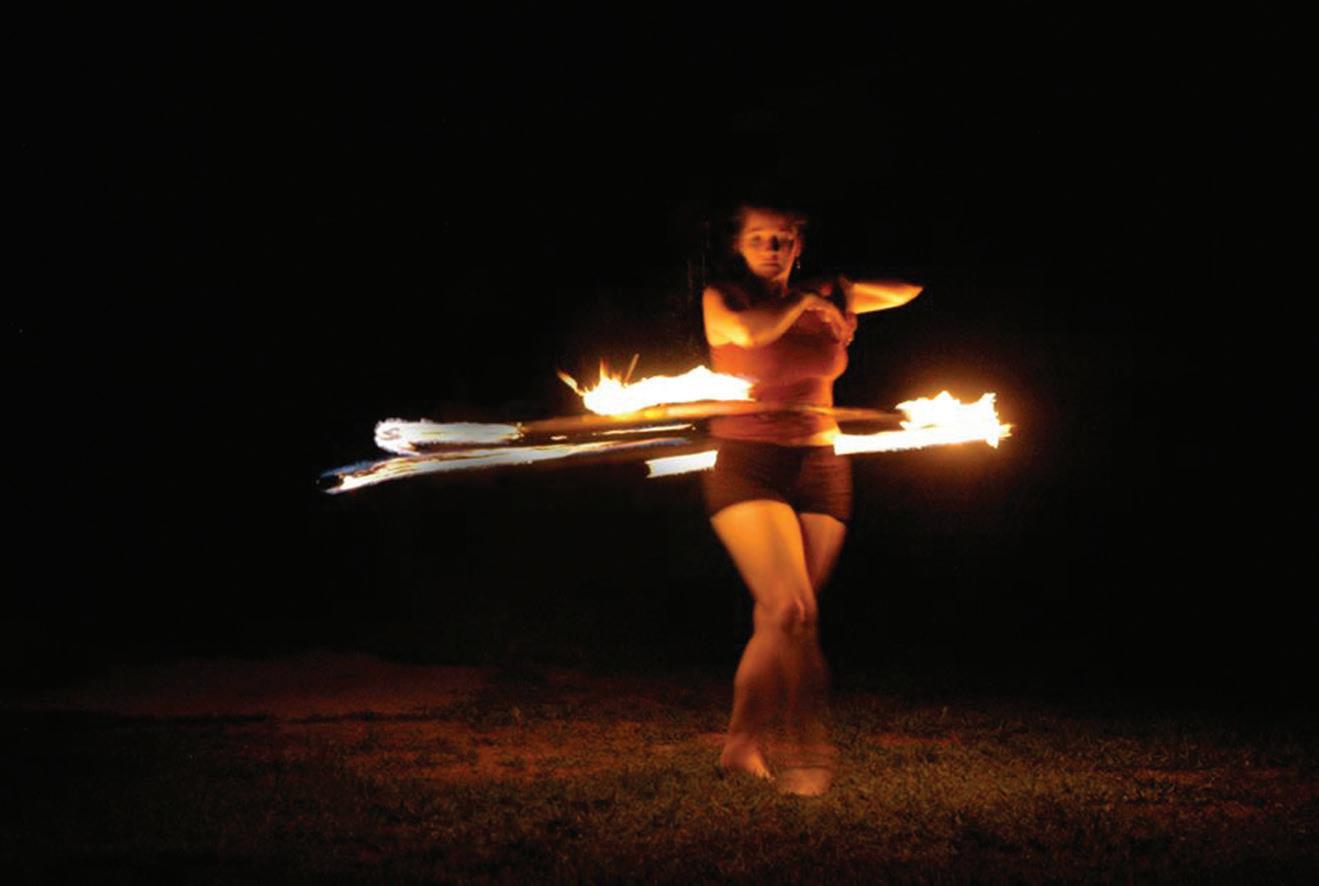
The lunatic shouted something indiscernible as he cut open the girl’s stomach and pulled out her insides.
W hen they found him, the lunatic had the girl’s intestines between his teeth, hot, red blood trickling down his chin. He was crying with pieces of her pale skin and strands of her blonde hair stuck to his body like a macabre collage.
W hen they brought him before the judge, it was not Satan’s name the lunatic called out in his ecstasy, but God’s. He stood up in his chair and proclaimed he it was all for God.
Ninth Facet: Denial
The man says that the Devil isn’t real. He says that there’s no aliens out there in the black, emptiness of space. He says he doesn’t believe in ghosts, or the boogeyman, or monsters under the bed, and then he takes another swig of beer and buys a round for the guys.
But his wife knows that when he gets home the man always peeks in the closet before he goes to bed.
Tenth Facet: The Truth
“I’m so sorry Father. Can I please come home now?”
34 35
n oah g reenstein e m ily Curran
Big Bad wo lf Jon d
I have become ravenous. It has been days since my last drink, all the ugly pigs of this city are wise to my games. So I sit, in the shadows of this alley, waiting for my next meal to wander down the wrong path.
I shake like a bag in the wind, fearing nothing will come to satisfy my needs. Will I hold my gun steady?
My eyes begin to sag as the hours wear on, I can hear begging and squealing as I drift off, a Pig telling his two swine it will be ok. But it won’t…
A new victim stirs me awake as she walks by, all I can see is that crimson sweater. Red as nameless pig’s blood.
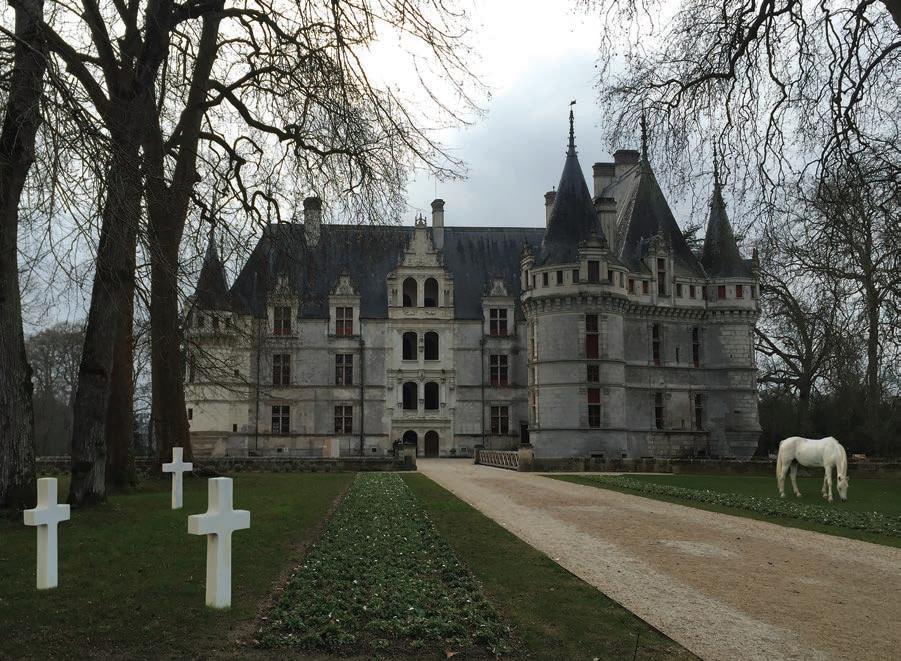
The girl hears my approach. She has heard rumors of a “Big Bad Wolf” in these parts, and does not plan to fill his gullet.
She turns and looks me right in the eye without an ounce of fear, as my hand rises from my pocket, I feel the bullet in my chest. It doesn’t hurt; all I feel is the warmth of my blood. Just like the pigs.
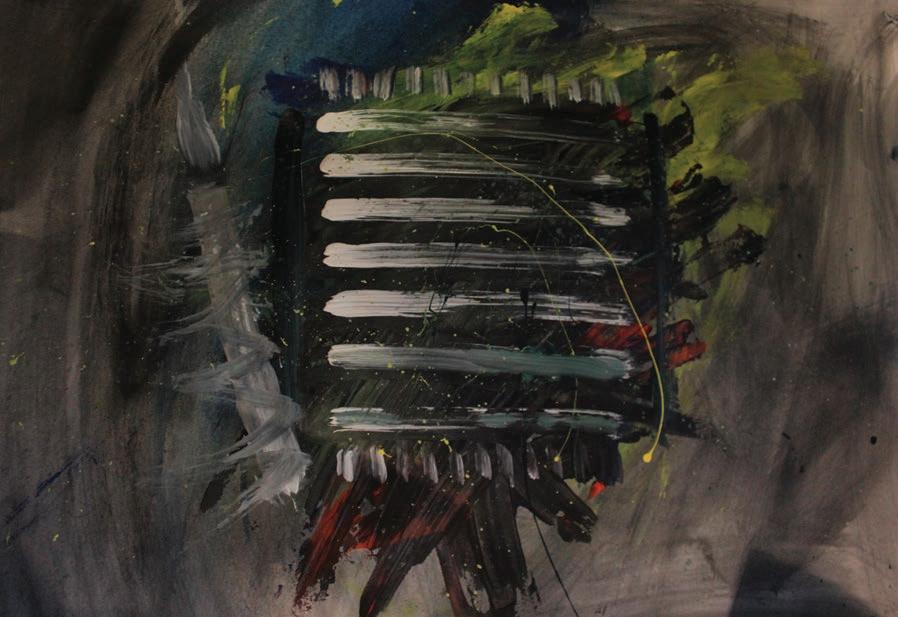
As I fade away, I see a man approach the girl and put his hand on her shoulder. Then bends down to feel my pulse, his hand burns my flesh. The last thing I see is a name on the badge.
T.J. Huntsman…
36 37
Paige fournier
Carlos g o nzalez
rew
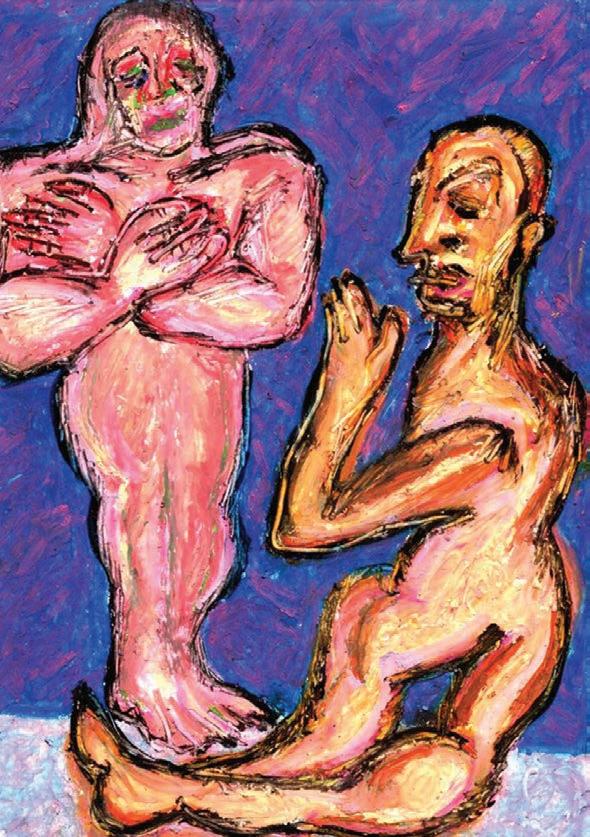
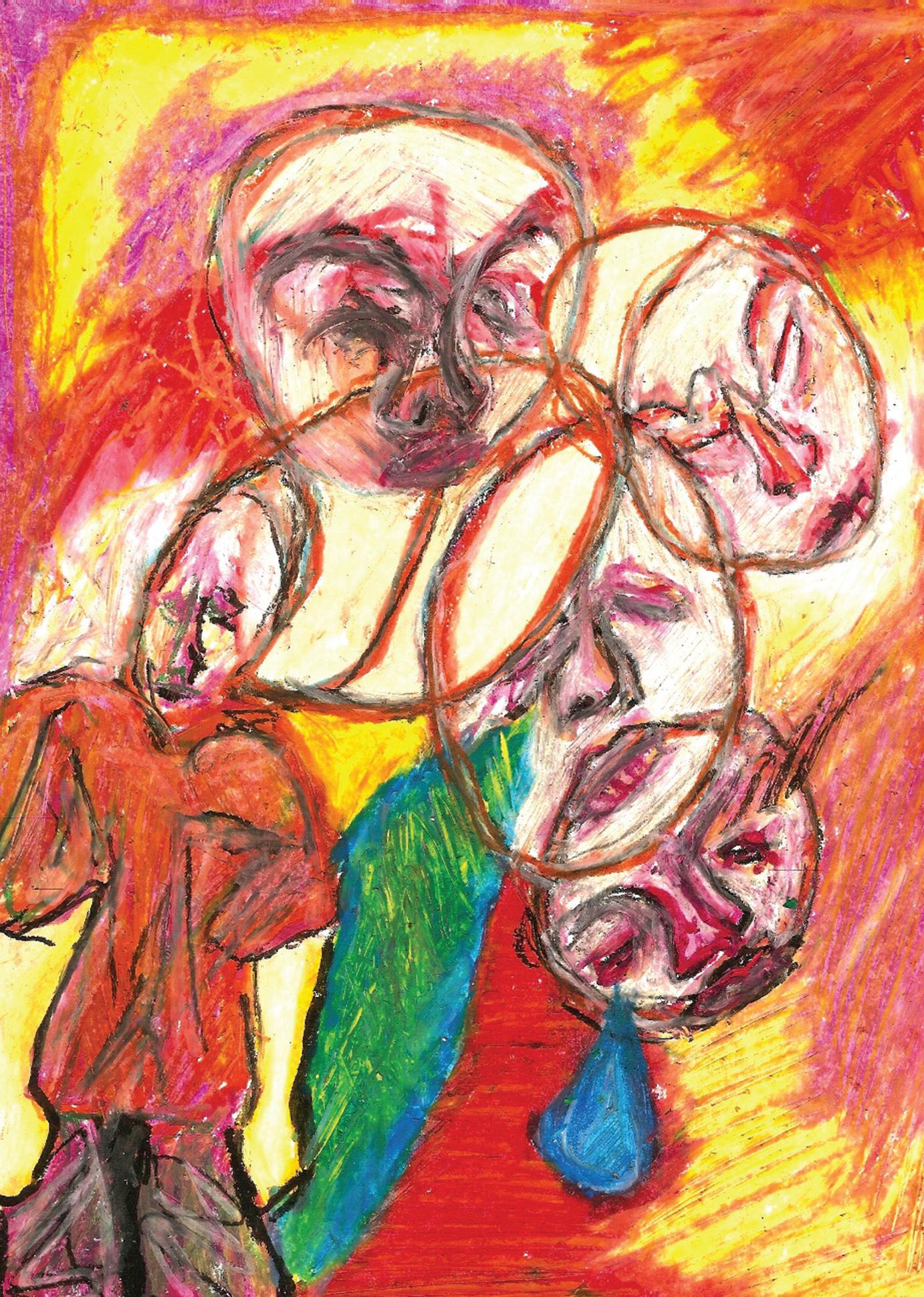
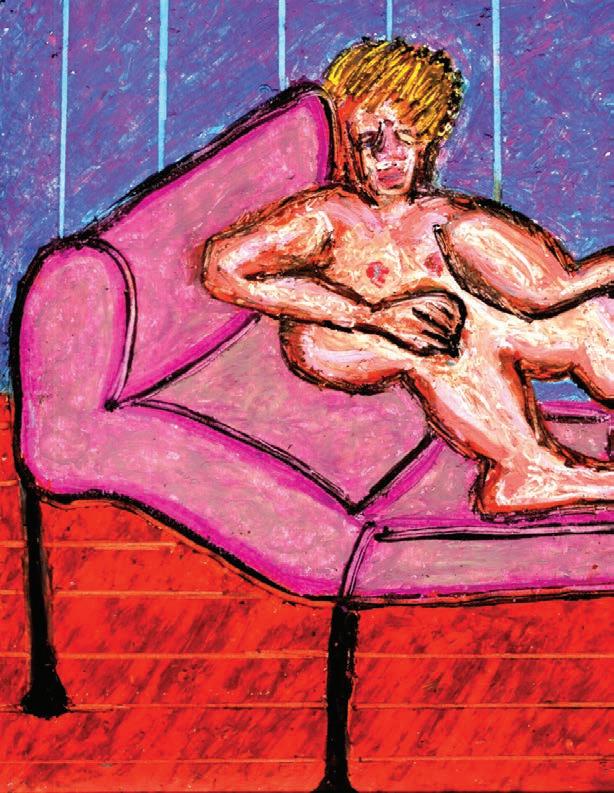
38 39
James ma clean
James ma clean
James ma clean
Slicing storm fronts form
Sweat creases the brows of men
The sun beats its drums
Brisk winds beat the heat
The leaves are fallen soldiers
Cool air kills the trees
Raging ice coats all
Tidal wave of white consumes Blizzards start to form
The snow starts to melt
The roads are slick and shiny
There grows a flower
oN a Cor N er o N the g ood s i de of towN
Justin m erced
I try each day to free myself of all this pain, But haven’t managed to sell any of it yet.
Rivalry is savage in the city though, so I take care
Only to sport the fi nest of trench coats, which I jerk open Like the arm of a turnstile as passersby ramble past me, And I put on my best frown and moan the words, Pain for sale.
But they all assert the same thing: I already have some at home or I’m wearing mine now. Some hold my wares in contempt as being cut-rate, Like I’m some kind of petty hoodlum peddling anxiety. Some compare their pain as foreign or unique, claiming Only to buy the most rare and expensive obtainable. Not like a vagrant who boasts nothing.
One such man once dwelled where I sell my goods.
I’d grimace, dangling my pain before him, Tempting him to buy what he can’t afford; and I’d ask, Do you plan to die without any, and he’d say
It’s all the same, and would fl ash me a smile for free. He never seized on my advice and died in place.
I’ve stood here since and still no pain’s been sold.
41
easo N s
s
ty ler k sypka
40
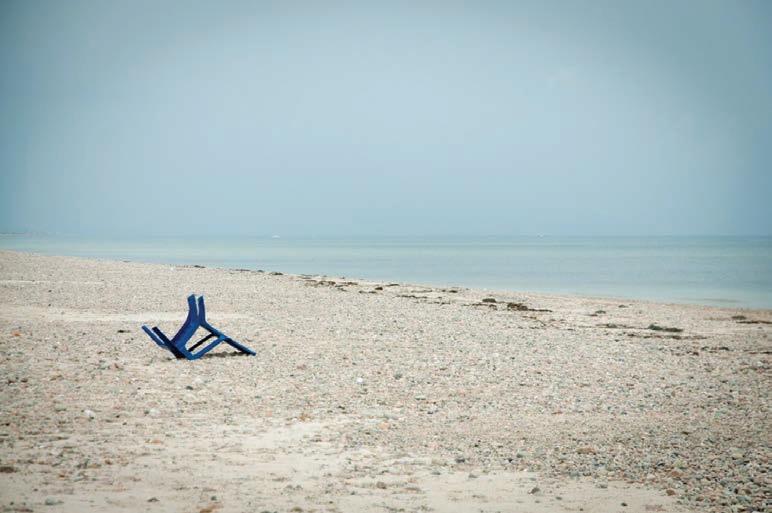


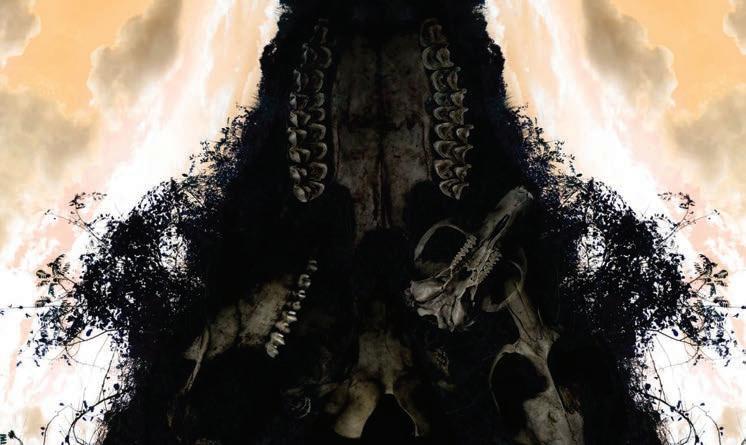
42 43 e
g eo rge medelinskas g eo rge medelinskas
m ily Curran
ka iley Johnson
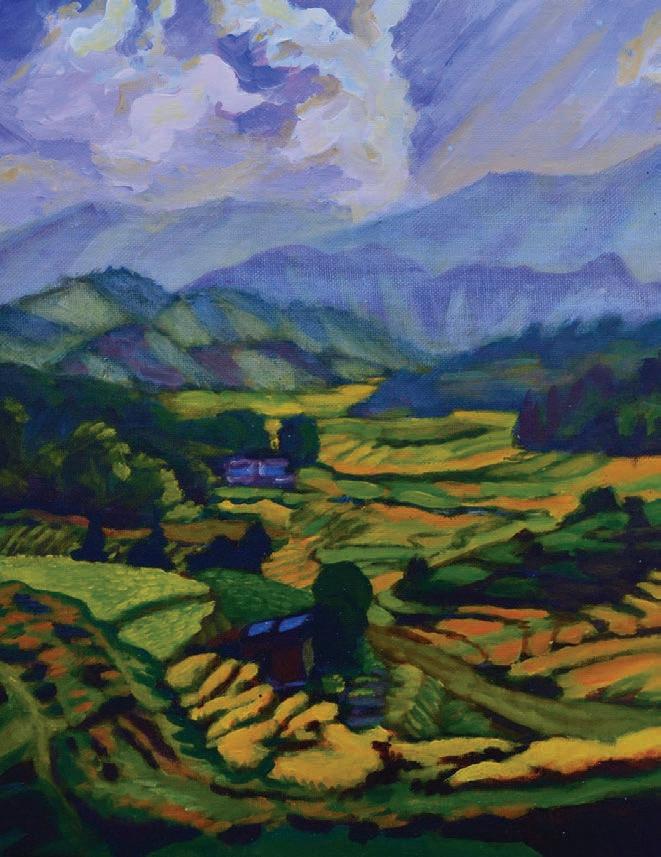
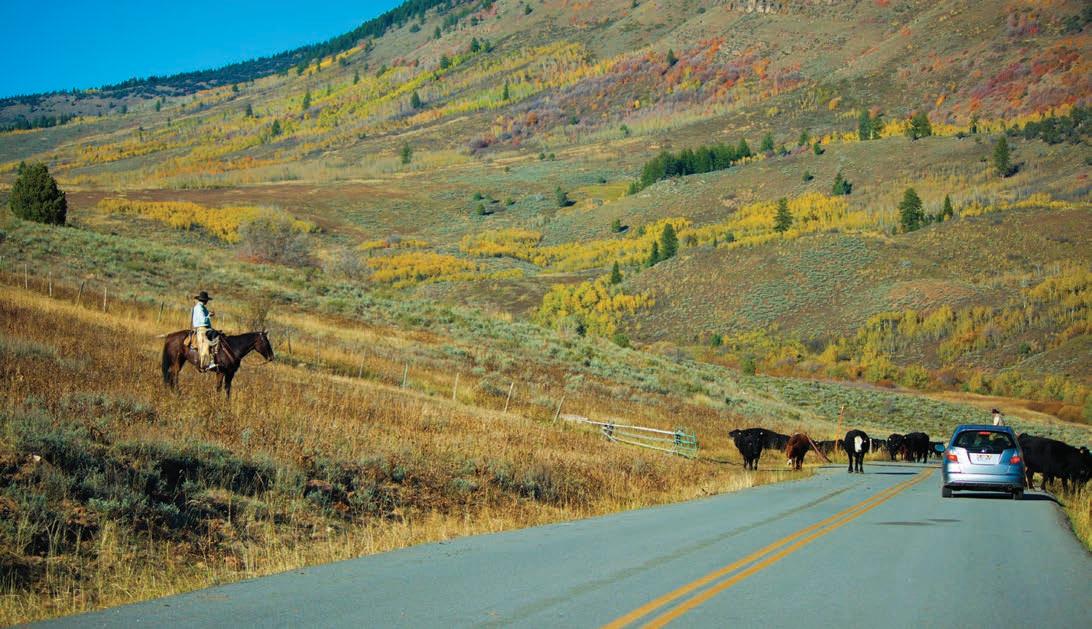

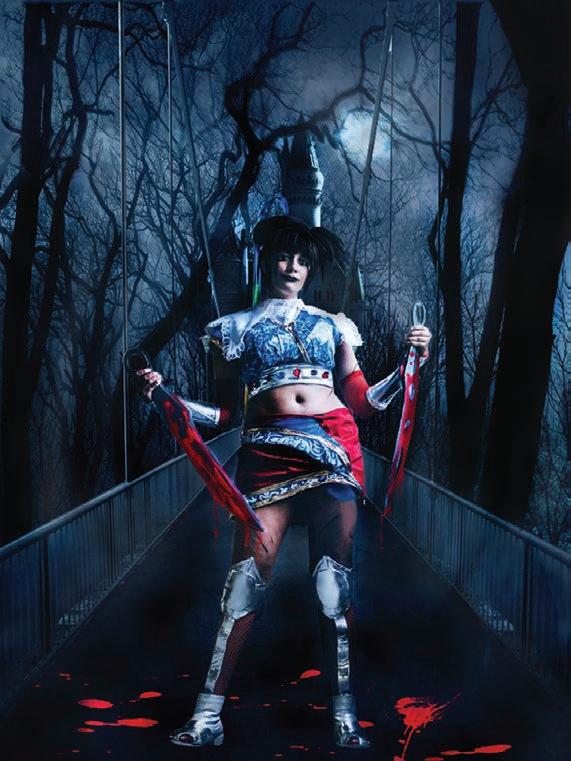
44 45
ka iley Johnson
m chele s mon
m chele s mon
Carmen luciano
g ooseB u mps: “the werewolf of fever swamp” fu Cked with my yo uth
kati e la nglois
I was eight years old when I decided werewolves were going to kill me. They were going to chew on my chubby little body, slash and shred me apart. I’d dream about the deep woods of my backyard: swamp stench sticking on my skin, bent birches pointing the way to my death, wet leaves transforming into teeth and fur. No one to protect me; I was a meaty Christmas present left under dead pine trees. I’d stare into those woods to undo my worries, but I saw them; clawing and climbing in the movement of branches. If anything really happened, dad figured, pull the ol’ “trip a friend and run for your life” shtick. But I was a little fat kid and I had no friends.
I’d find sanctuary in my hand-me-down clubhouse (which was just a doghouse my dog didn’t want.) Doodling monsters on the splintered walls with crayons and markers, violent eyes turned soft, bloodied paws to claws full of sunflowers, ripped white flag waving; a real pretend truce.
sto N e Clare thompson- ostrander
I found Mr. Sam at the bottom of his cage, his beak open, his legs bent like paperclips. My daughter cried, of course. Lulu was only eight and Mr. Sam was her fi r st pet. She doted on the bird, cleaned his cage and hung mirrors so the bird could admire his feathers. After the bird died, she cradled it in her palm and shut its eyes eternally.
She’d seen Father Mike do the same to Grandpa Toots. We were in church when death stopped his heart. My husband, Tommy, yelled, and Lulu screamed. Everyone hovered near Tommy as he cradled his dead father in his arms. Father Mike read Grandpa Toots his Final Rites and shut his eyes eternally.
But I have a confession.
I did not cry, and I do not miss Grandpa Toots. His dying was the best thing that ever happened to my family.
F ather Mike knew my husband was taking it hard, but Tommy’s troubles started long before Grandpa Toots died. Tommy hadn’t worked in two years and we were one step away from food stamps, so Father Mike hired Tommy to do odd jobs for the parish. It started with fi x ing the railings at the back entrance of the church. “You can do this sort of work, can’t you?” he asked.
“Of course, I can.”
“ The work will have to be done in the evenings, during the week,” Father Mike said. “About a month’s worth, I think.”
“Under the table,” my husband said.
“If that’s how you want it, and I’m pretty handy myself when I’m out of these clothes, of course.”
“ We’ll see,” Tommy said.
F ather Mike was an easy priest to take. Sometimes, we’d catch him out of his clerics, wearing a fl annel shirt, jeans, and sneakers, but only on the days he was fi x ing some broken thing in the church. Rumor had it he lived a different life before he took Holy Orders. Something about the hell he raised as a teenager surfaced in the stories people told. He and Tommy were the same age, 48, both born and raised in our town, and my husband didn’t trust him. Said Father Mike was a gimmick, but Lulu and I loved him, just like most of the people in our parish loved him.
I was in bed the night Tommy finished the railings. I remember we were in the middle of a rainstorm, a Nor’easter. Weather forecasters predicted power outages, downed trees, and slippery roads due to wet leaves, so I fi gured on Tommy being late. And Father Mike was a talker. Conversations could last for hours with him, so I fell asleep with my daughter’s back against my side.
W hen Tommy came to bed, he asked, “You awake?”
His hair still wet, he seemed irritated.
“How’d it go?” I asked him.
“He wants me to repair the stained glass windows in the lower church. Six to eight weeks’ worth of work, might take us through early fall.”
“ You know how to do that sort of thing?”
“Of course,” he said, about to get mad.
“Did something happen?”
“No, nothing happened. I’d just like to know what the hell you’re telling Mike.”
“It’s Father Mike,” I said. “And I don’t tell him anything he doesn’t already know.”
46 47
Two months after we lost Grandpa Toots, my husband buried Bobo, our Golden Retriever. He buried the dog next to my cat, Perla.
I remember holding Perla in my arms, waiting for epinephrine to seize her heart. The vet asked what I’d like to do with the body, and I told her I’d keep it. When I got Perla home, I kissed her fur and buried her in the garden where our pansies grew. But my daughter wanted a gravestone for Mr. Sam. “A real one,” she said. “Like the ones Daddy and Grandpa Toots made.”
“ You’ll have to ask Daddy,” I told her.
“I want one for BoBo and Perla too,” she said, taking crayons and paper from the junk drawer in the kitchen. She spent the next hour designing our family gravestone.
Grandpa Toots made a living in monuments. Where Snow Street ended a little foot path began and took you to Toots’ workshop. We could see his workshop through our living room windows. Sitting on the couch, you’d think the workshop was meant to be framed by window curtains and trees. Only the slant of the roof gave any hint of a man carving stones in the woods.
W hen Tommy was small, he and Grandpa Toots lived in the workshop, a place fi lled with carving tools, sandblasters and gravestones. Tommy told me when he was a boy he’d watch the house on Snow Street. A family lived there, a mother, a father and two children, a girl and a boy. He watched them ride their bikes. He sniffed the air when the father fl ipped burgers on the grill. “I was always watching them. We didn’t have a television,” he said, making a joke. One night he snuck out of the workshop, down the path to the house on Snow Street, and into the backyard. He looked around at the toys lying in the grass and tucked a bucket of sidewalk chalk under his shirt and ran. His arms, a dusty rainbow by the time he got back to Grandpa Toots, asleep in the workshop. Go d forgive me, but I hated Grandpa Toots. My husband tells me he was a good man, never laid a hand on him, but I’d heard stories about his fathering, how Tommy went to school in torn clothes, how he carried lice, and never a lunch. By age eight, Tommy was in his fi r st foster home. He celebrated nine birthdays with other families until he ran back to Toots at age seventeen. Near as I could tell the only stable relationship Grandpa Toots had was with God. Grandpa Toots took Tommy to church every week, said his mother was an angel fl o ating through the rafters. Tommy never saw the angel, but every week he went to fi nd her.
Grandpa Toots never cared for Lulu or me, but Tommy said, “Things happen to a man to close him up like that, things so dark they’d make your heart blind.” So I did my best to navigate Grandpa Toots, but it was hard. For example, after it was clear Grandpa Toots was dying, my daughter made him a paper fl ower with a tinfoil stem. She put it on the front steps of the workshop and waited for Grandpa Toots to take it inside, but he never did. After she fell asleep, I put on my shoes and coat, walked past the gravestones, and took the paper fl ower under my coat. Before I turned to leave, I saw Grandpa Toots watching me from his window, his eyes, fl at as stone.
A fter Toots died, Tommy’s nightmares returned. Some nights he woke to his own screaming. Other nights he’d curl into my arms, but the night he woke up naked and standing in front of the open window I told Father Mike I worried about Tommy’s dreams.
I told him a little of what Tommy survived in his waking life. How when Tommy was a teenager, his classmates dared each other to walk the wooded path and smash the windows of Grandpa Toots’ workshop. When Tommy told me the story, I imagined the boys creeping through the trees with fl ashlights, howling before they hurled rocks through the windows. I didn’t have to imagine the shattered glass. I’d seen the duct taped windows. And when the boys discovered Grandpa Toots was the foster kid’s father, Tommy was pushed into lockers, had his lunch stolen,
or worse, like the time the boys stripped him and shoved him into the trunk of a car. They duct taped his mouth and hands and drove for hours before they dumped him in front of Grandpa Toots’ workshop. All Tommy remembers is how they called him a freak.
“God’s tested your husband,” Father Mike told me.
“ Yes, Father,” I said. “I know he’s been tested.”
F ather Mike was pleased with my husband’s work on the stained glass windows. The steady paycheck made our whole house feel lighter. Our bank account was breathing again, though I knew inside moments like this I’d find a crack, a leak, a realization that we’re only $50 from broke. But Lulu was happy because the fridge was full, and in the cabinets were Oreos and Fruit Loops.
L ulu heaped Fruit Loops into her bowl, added milk and waited for it to run pink. Tommy smiled when she shoveled a spoonful of cereal into her mouth.
“Mike also gave me a lead on a monument,” he told me.
“Father Mike,” I said.
“Father Mike, of course,” he said. “Anyway, Father Mike said a lot of folks are lost without Toots. Some joker’s charging three times more for monuments. Imagine at a time like that, ripping people off?”
“ That’s terrible,” I said. “But, gee, could be a real opportunity there. I mean you making monuments again could get us by.”
Tommy’s eyes narrowed, and he said, “Jesus Christ, can my father be dead for ten minutes before we start with the opportunities again?”
“Of course,” I said.
M y cheeks burned as red as my husband’s.
“I’m just helping out a family Mike knows. That’s it. They’re coming by tomorrow to pick a stone, they’ll be here around 3:00 p.m.”
L ulu looked up from her cereal bowl.
“ What? Who’s coming?”
“Grown up talk, sweetie, eat your breakfast,” I said.
“But Daddy’s making a gravestone?” she asked.
“ Yes I am,” he said.
Tommy avoided my eyes and smiled at our little girl. Lulu clapped her hands, her eyes went big. She hopped off her chair and ran for the fridge, taking her drawing of our family gravestone out from under its magnet, holding it up to my husband’s eyes.
“Daddy, you have to make this one fi r st!”
“ What’s this?” he asked.
“She wants you to make a gravestone for Bobo, Perla, and Mr. Sam,” I said. “She wants a family cemetery.”
48 49
“Yes, Daddy, please? So we can visit them,” she added.
“Of course, I’ll make a gravestone, and you’ll help me,” he told her.
Lulu fl ung her arms around his neck, “Daddy! Daddy!” she squealed.
T he other day I found Lulu sitting before the empty bird cage making paper fl owers. She used every color in the construction paper variety pack, rolling and pinching strips of paper into fl owers with tinfoil stems. She cooed at the empty cage as if Mr. Sam was still her living friend. Holding fl owers up to the ghost-bird, she asked, “Is this one right?”
Tommy clings to ghosts, too. Bobo’s empty dog bed stays in the corner of our room, his leash, on the hook by the front door, but I’m no better, really. When I make tuna sandwiches, I leave the empty can on the fl oor until I realize Perla’s not curling herself around my ankles. I feel as empty as the can I toss in the trash.
M aybe we do need a family cemetery.
F ather Mike helped Tommy clean out the workshop. He showed up wearing a t-shirt, jeans, and a carpenter’s tool belt around his waist. Standing next to Tommy, he looked like a regular man. They cleared tools and rolled un fi nished monuments out into the yard using long pipes. It was heavy work, but Father Mike’s sense of humor made it easier. They got rid of trash, used the shopvac to suck up the dust, and tore up the rotten fl oor boards from the corner of the workshop where my husband slept as a boy.
L ulu and I spruced the small yard in front of the workshop. After we raked away the dead leaves, we found some dandelions reaching through the dirt. She picked them and placed them on the monuments Grandpa Toots had on display.
“They’re pretty, Momma,” she said, whispering like she was in church. One stone was the same pink color as her skin. Etched on the front of the stone was a portrait of Christ, his sacred heart exposed and his arms out like he was gathering wind. Lulu ran her hand over the etching of Christ, placed the dandelions on the stone, and said, “I want ours to be as pink as this Jesus one.”
Tommy and Father Mike used a month to make the workshop whole again. Daily, I made sandwiches for them. They were always covered in sweat, but they were always smiling. I watched the two of them, sitting on the front steps of the workshop, eating sandwiches, drinking iced tea, talking the way men do. But God forgive me, I was jealous of the words they shared, words that made Tommy smile again, words that made him wake up in the morning to eat toast and drink coffee, words that made him notice I was next to him on the couch. I tried my hardest not to let negativity creep inside my grateful heart, but my words have never made Tommy look up, never helped him build any plans, and I heard my mother words telling me that woman can’t love a man’s demons away.
“He’ll resent you for it,” she said.
“He’s been tested, mom,” I told her.
“So have you. So have you.”
I craved a real camera in moments like these. I wanted to push away the negative and focus on the good in my life. If I had a real camera, I’d zoom in on Tommy sitting with Father Mike, laughing and sharing words, and Lulu nearby, picking dandelions from the grass. I’d wait for the peach skies to bloom. Then snap. I’d get the shot and hang it on the walls of my very flawed heart.
B y the time I get home from The Lantern, Lulu’s already in bed. I creep into her room to kiss her good night. I see scabs of paint on her skin and make a point to ask Tommy about the progress they made painting the workshop. I head to the
bathroom, shower the restaurant stink off my skin, and slide into bed next to Tommy. Our room is dim, lit only by the bedside lamp. Tommy’s awake, still in his clothes, reading The Shack by Wm. Paul Young, a book Father Mike gave him.
“ You showered,” he whispers, grinning. “You’re naked.”
I t ake the book from his hands, and run my fi ngers under his shirt before they wander across the button of his fl y. He lifts one eye brow and smiles, takes a line of my wet hair to his mouth and kisses it.
“ Today go all right?” I ask him.
“She’s got a steady hand,” he whispers, arching his back, closing his eyes.
“Like you,” I say, kissing his neck.
“ We had a great day,” he tells me.
“Of course, you did.”
His fi ngers slide along my hips, around my waist and down the line of my back. Our legs warm the sheets, and he pulls me up on top of him so that our hips move together the way they do.
“ You and me,” he whispers.
“Me and you,” I say. I t ilt my head back and let my breathing rise.
“Before we make First Communion, Father Mike says we have to confess our sins,” Lulu tells me. She hands me the notice her CCD teacher gave her. Father Mike will hear confessions next week after Mass.
I t’s a big year for my daughter, her First Holy Communion in May, and we’ve got $100.00 from my mother to spend on her dress. We head to the back section of Big A’s Discount, where the fl oor clerk is unpacking dresses from their boxes. My daughter sees a nest of lace she can’t resist.
“I haven’t tagged them yet,” the girl explains, but she lets my daughter hold the dress up to her chest. My daughter twirls in front of the mirror and the girl laughs. “Go ahead, try it on.”
L ulu steps out of her winter slacks and shirt, pulls the dress over her head and tells me, “Father Mike came to our class and told us about a bad man who came back home to say he was sorry for his sins.” I help her adjust the tangle of lace, and she pushes her arms through the sleeves. I zip up the back of the dress and place the veil on her head, a simple tiara beaded with faux pearls and draped in white tulle.
“ That’s quite a story,” I say, smiling at her re fl e ction in the mirror.
“ Yes, do you know that story?”
M y daughter lifts her hands in the air and turns to catch her side view in the mirror. She stands on her tippy toes and smiles.
“ Yes, the prodigal son, right? The mean boy comes home and his father forgives all of his sins?"
“ Yes, Momma, that’s it, that’s the story Father Mike told us today. Only I don’t think I’m a sin. Do you?”
“No, you’re not a sin or a sinner, but sometimes we all have to say we’re sorry for something.”
“Even grown ups?”
“ We can even get shoes!” I tell her.
T he night the boys stuffed Tommy in the trunk was the same night he got arrested. It was his only offense. He wasn’t a habitual criminal, but he was treated like one from time to time. He had a CORI in Massachusetts, which made it hard for him to fi nd work. If employers pressed further, they’d fi nd out he was a foster kid, and the arrest would add up, so my husband made
50 51
"Even grown ups?"
“Especially grown ups.”
“I want this one, Momma,” she says. I tell her to take the dress off so the girl can tag it with a price gun. My daughter presses her palms together like she’s praying and we both hold our breath until the girl hands me back the dress. I turn the tag to see the price.
“ We can even get shoes!” I tell her.
T he night the boys stuffed Tommy in the trunk was the same night he got arrested. It was his only offense. He wasn’t a habitual criminal, but he was treated like one from time to time. He had a CORI in Massachusetts, which made it hard for him to fi nd work. If employers pressed further, they’d fi nd out he was a foster kid, and the arrest would add up, so my husband made his living using his hands and getting paid under the table. We were getting by until Grandpa Toots got sick and my husband stopped working. At fi r st he stopped for a week, let the news of his sick father set in; then it became months of sitting on the couch, watching Grandpa Toots’ workshop through the living room window. On the bad days, he didn’t eat or let up the shades in our room. No light, no sounds during the day, just the vigilant wait for his father to die.
W ith two years of no work and that CORI around his neck, he told me feeble minded people had a better chance at fi nding work than him, so every month my mother sent mortgage money. Along with her checks, came her questions about me: “Have you thought about college? Getting something better than The Lantern? Do you and Lulu want to come live with me?” Along with her checks came her questions about Tommy: “Have you thought about a counselor for him? Can he collect?” And the extra phone calls about Lulu: “How’s that little girl of mine? Does she need a new winter coat?” Secrets grew between me and Tommy. I never told him from where the mortgage came, and he never asked. I also never told him Father Mike was helping me register for food stamps.
F ather Mike and I were in the lower church, looking at the stained glass windows Tommy repaired. My favorite was the one of Mary holding the Christ child in her arms. Tommy said it was dif fi cult to fi x her hands. They were so delicate and old, but she had to keep that baby in her arms. Tommy cut new hands out of pearl-colored glass, edged them in copper foil and soldered the lines with his steady hands. Father Mike said he’d never seen Mary look so beautiful. He also told me he was pretty certain he found a job for Tommy at the church, keeping the grounds, doing handyman work, 40 hours a week with bene fi t s. I was thrilled until the CORI caught in my throat. Father Mike had been such a part of our family and I didn’t want any surprises, so I told him about the CORI.
“It was a one-time thing. He’s not a criminal,” I said, pleading, and Father Mike grew quiet.
“I didn’t know about the CORI,” he said. His voice was sad like someone dropped a stone through his words, which took me by surprise. Father Mike was never rattled by words. He asked me to sit near him. Holding my hand, he said, “I’ve got something dif fi cult to tell you.”
“ What is it?”
“I remember that night.”
“ What night?” I asked him.
“I was there the night they found Tommy in the cemetery, the night he was arrested,” he said. “I tried to catch up to him, but
he was faster than me. He ran through the woods like he was reading them. He knew every tree, every turn in the trails, and I just fell behind. I lost him,” he said.
“After we left him on the lawn, the others ran back to the car, but I knew Toots would see me if I ran, so I stayed put. Toots came out and Tommy was torn up. He just ran and ran and ran.”
“Father Mike? I don’t understand. You were there?”
“Please. Let me fi nish,” he said, his words moving at a faster clip. “I followed him as best I could, but by the time I got to the cemetery it was too late. The police were already there. One of them had put their coat on him, but I could tell he was cuffed. Tommy was crying, sobbing, so an of fi cer had his arm around him, and I saw that he was in front of a grave. I believe it was his mother’s grave. One of the of fi cers held a fl ashlight just so and I saw the line of urine on the stone. I heard the other of fi cers talking; how when they found Tommy he’d been relieving himself on the grave. But I never knew about the CORI. My God, forgive me.”
“ You?” I said. It was the only word I could fi nd.
“ Yes,” he told me. “I taped his hands.”
I drew my fi ngers away from Father Mike. His words sank into my skull and made my lungs take in short, suffocating breaths. When Father Mike put his arm around my shoulder, I fl inched, wiped my nose on my sleeve and told him, “This can’t be true. I can’t hear anymore. I need to go.”
“Please, wait,” he said, but I was already standing away from him, craning my neck toward the rafters of the church, where the angels painted on the ceiling burned like fog.
Grandpa Toots is buried in the town cemetery next to Tommy’s mother, but hers is not the grave people notice. It’s too simple, too much like all the others, seagull gray, marked only by a white cross and the word “Love.” Grandpa Toots’ stone is the one that brings her to life again. Her portrait is etched on the stone, and she’s the one I talk to when I visit Grandpa Toots’ grave.
I sit on my knees and trace her stone portrait like I’m blind and reading Braille. I close my eyes and let my fingers read the strands of her long hair and her delicate eyelashes, her lips. I follow her fi ngers, touch the baby boy she holds in her arms. I do this again and again, as if to wake some instinct buried inside the stone, an instinct that would make her snatch that boy away from any kind of harm, and in my mind I bring color to her cheeks, make her body round with fl e sh, give her the scent of lavender and milk and fi ll her voice with hushes and whispers. I make the weight of her boy the air she breathes, and under her skin, inside all of her internal noises, I go beneath her ribs to probe the vessels and alleys of her heart. I rewire them until Tommy becomes the root of all of her promises. I force her to leave imprints of love on his skin, and I weep for him, for me, for Lulu because we’ve all been trying so hard.
“How did you meet Daddy?” Lulu asks, though she’s heard the story a million times. “ You tell me,” I say, teasing her. I pull her blankets up to her neck, and she pushes them back down to her belly.
“Too high, Momma, like this,” she says, arranging her blanket
52
53
around her waist and pulling her toy bird under her chin. She starts the story with, “You were the new girl in town.”
“That’s right. I was new in town, working at The Lantern. Your dad had been working with Grandpa, making stones…”
“…and they got hungry.”
“Yes, men always get hungry,” I tell her and she giggles, clutching her toy bird to her chest and wiggling her legs under the sheets. I continue, “Daddy sat in my section and ordered a BLT with extra pickles on the side.”
My daughter brings her hands to her open mouth like she can’t wait for end. “And he thought you were beautiful and he liked your voice and he asked you to marry him,” she says, kicking off her blankets, laughing so hard she’s bent in half and rolling onto her side.
“Yes! And we lived happily ever after on Snow Street,” I say, tickling her ribs, making her squeal.
“Then his parts went inside your parts and you made a baby. Me! Me! Me!” she yells, jumping to her feet. She raises her hands in the air, places an invisible crown on her head and spins all around her mattress.
I’d seen Tommy around town before he sat in my section to eat the BLT. “You have an amazing voice,” he told me, and all the ghost stories swirling inside of his eyes blinked. His visits became more regular, and soon he took me to the cemetery to show me the stones he made with Grandpa Toots.
S ome had angels with wings stretching over the names of the dead, or crosses surrounded by olive branches, but my favorite was the black marble stone with the white etching of a seascape. Waves crashed over a jetty and in the distance, a lighthouse sent arms of light across the stone.
Our last stop was at his mother’s gray stone with a white cross fl o ating above the only word, “Love.” I touched the stone with my fi ngers, traced the lines of the word.
“ This was the fi r st one I made on my own,” Tommy said. “A little clumsy, but she’d gone unmarked 18 years, so I made her a stone. It wasn’t right to leave her unmarked.”
“It’s beautiful,” I said.
“It’s all right. What can I say? I was young.”
“ Why didn’t your father make her a stone?”
“He’s been working on her stone for years. I think he’ll die before he finishes it, but it’s amazing, a portrait of her holding me as a baby, but she felt so alone out here in the cemetery, unmarked, so I made her this one. It’s fl a wed.”
He p ointed to her gravestone, showed me all the mistakes he made cutting into the word, “Love.”
“ Words are tough,” he told me, and I believed him.
M y mother stayed with us the week of Lulu’s First Holy Communion. She packed a small suitcase and two presents: a new camera for me and a graduated pearl necklace for Lulu. The necklace is identical to the one she gave me as a girl. It doesn’t look like much at fi r st, just a clasp and string holding one cloudy pearl. A week after I was born my mother walked into Tinto’s Jewelers and bought me a single pearl on a string. Mr. Tinto placed my pearl in a blue satin lined box that snapped shut. He told my mother to come back each year on my birthday to add another pearl, but my mother had other plans. She wanted me to grow my pearls.
Here’s the story she told me about pearls:
Deep inside an oyster’s heart lies a pearl waiting to come alive, but the oyster must wait until it’s been tested. Something must try to hurt the oyster’s shell before the pearl is born, and when that bad something cracks into the oyster’s shell, the oyster takes all of its hidden strength, all of its nacre, and wraps it around that terrible something, over and over and over again, until it becomes beautiful ball of light, a pearl.
Here are some of the pearls I grew:
W hen I won the spelling Bee in third grade, I got a pearl; when I had my tonsils out, I got a pearl; when Jackie Toomey broke my heart in eighth grade, I got a pearl, and when I moved across the country, I got a pearl. My last pearl came the day I got married. My mother wrapped the pearls around my neck and told me, “A woman needs all of her strength to make a marriage work.”
M y mother holds a blue box from Tinto’s in her hands. She calls Lulu into the living room and asks her, “Have you been a brave girl this year?”
“Oh yes! Oh yes!” Lulu says.
“ Tell me one brave thing,” my mother says.
L ulu’s eyes squint. Her forehead’s bent. She’s thinking, searching her memories for something brave because she sees my mother holding the blue satin lined box. She fi dgets in her seat until a light goes on. An idea has come. She smiles wide, pulls my mother’s hand and tells her, “Follow me!”
I follow my poor mother, still clutching the Tinto’s box in her hands, wearing her heels and laughing at her own missteps over the grass and rocks. She lets Lulu drag her to where the path begins. Then I know where Lulu’s heading. I worry because I haven’t told my mother much about Tommy’s childhood home, but when we are closer to the workshop, I see no traces of his past. For starters, there’s a stone path to the front door so customers will know where to fi nd Tommy, and below the windows, a patch of perennials and hydrangeas attract living birds and butter fl ies. Out back, where my husband has his stones on display, he’s cleared some dead trees to let in more light, and he’s raked out years of brush and rot from between the stones his father left behind.
I t ake my mother inside the workshop, show her the new windows and the sturdy workbench for Tommy’s tools. Lulu’s favorite spot is the corner, where my husband slept as a child. She fi nds the old bucket of colored chalk.
“ This is Daddy’s new workshop,” Lulu tells my mother. “He made it with Father Mike.”
“Really?” my mother says, very pleased.
“I want to show you the graveyard, Grammy,” Lulu says. We follow Lulu to the backyard where my husband’s stones are on display.
“ This graveyard used to be dark and scary,” Lulu explains. She raises her hands above her head and wiggles her fi ngers. My mother and I laugh, and Lulu knows she’s got an audience. “I used to be too scared to touch the gravestones,” she goes on, creeping up to a stone with slow exaggerated steps. She moves her eyes from side to side, makes her hands tremble until she lifts her fi nger into the air before she fi nally touches the stone.
“See, Grammy, I’m not scared of the gravestones anymore.”
“My goodness!” my mother says. “You’re a brave girl.”
“I am! I am!” Lulu says, all smiles, dancing around my mother’s hips, saying anything to get that Tinto’s box in her hands, but my mother doesn’t let her have it right away.
“First,” she tells Lulu, “Grammy needs to tell you a story about pearls.”
F ather Mike’s up at the front of the church. The whole place is covered in Easter lilies and candles, and rising up behind the altar is the stained glass window of Saint Michael dressed in armor, driving the Fallen out of Heaven with a spear. It was the fi r st of ten windows Tommy repaired. All the communicants sit at the end of pews, their parents and families next to them.
I look over at Lulu, a real life princess, her dress fl o ating around her
54 55
tiny frame. She pays more attention to her new shoes than she does to Father Mike, but I don’t care. My mother snaps a picture of her with the new camera because I’m still fi guring out how to use it. Lulu smiles at all three of us, then mouths the word, “Cake.” She’s so excited about the cake my mother ordered, the one with the Holy Cross made of butter cream frosting.
Father Mike calls the children to line up for their First Holy Communion. My daughter looks over her shoulder at my mother, Tommy and me. Tommy takes my hand and we both smile at Lulu, nudging her with our look to follow the other children. She presses her hands together like she’s praying. When she’s in front of Father Mike, she cups her hands and whispers, “Amen,” but all I see is a mean boy hiding in the woods, watching my Tommy fall.
M y husband wants a picture with Father Mike, so after the ceremony we wait in line with the other families. When it’s our turn, Father Mike stands behind the three of us. My mother’s giddy to meet the man who helped build the workshop, and before she snaps the picture, she yells, “Say cake!” After the picture, my husband says something funny to Father Mike and shakes his hand. My daughter gives him a high fi ve, but I don’t shake hands with Father Mike. I hardly know where to look when he addresses me because all I see are Tommy’s duct-taped hands. Even when I’m helping Lulu fi x her veil against wind, I see Tommy’s duct-taped hands.
W hen we get into the car to drive home, my mother shows me the pictures she took with the new camera. All of the pictures make me smile, except the one of my family with Father Mike. In the picture, my husband’s looking at Father Mike, smiling as if Father Mike’s made a joke. Lulu seems in on it, too. Her smile’s as broad and wide as Tommy’s. You’d think my family was meant to be seen in just this way. My husband at peace with the man who duct-taped his hands and Lulu letting him touch her shoulders. I’m the only one not smiling.
“Say cake, say cake, say cake,” I tell myself the whole ride home.
“I invited Father Mike to stop by,” my husband tells me.
“I guess we have plenty of cake,” I say.
M y words are prickly. Sharp.
M y husband and I are in the kitchen, whispering because Father Mike’s in our living room talking to Lulu. Father Mike’s brought her a present wrapped in a gold box. My daughter tears into the box and takes out a pink ceramic cross. Father Mike shows her the hook on the back, explains how it hangs on a wall in her room. She holds the cross in her hands like it’s a dance partner, twirling three times before she remembers to thank Father Mike.
Tommy and I are still in the kitchen. “It’s not his fault the church job fell through,” he tells me. His voice is hushed because we’re within earshot of Father Mike. Tommy’s not looking for a fi ght. He hands me a plate so I can serve Father Mike a piece of cake. I lob off a corner piece, slap it onto the plate and stab the top of it with a fork, ready to serve.
“I know it’s not his fault about the job,” I tell him, my voice rising. “I know exactly what is and is not his fault.”
“So do I,” Tommy takes my waist in his arms, but I push him away. I’m holding the piece of cake and don’t want to drop it on the fl oor. Or maybe I do so I can serve it scraped and mangled to Father Mike. Tommy whispers into my ear, “Please.”
“Please what?” I ask him. I don’t need a mirror to tell me my face is red hot.
“He’s a good man. We all make terrible mistakes, irrevocable mistakes, but this one needs to end,” he tells me, and I feel a surge in my breathing. I don’t want to cry, but my words come in pieces.
“ You know he was there that night?”
“ Yes,” he says, smiling a little. “I was the guy in the trunk, remember?”
“How can you joke? How can any of this be funny to you?” My eyes blur with tears and I swallow gulps of air. Tommy’s eyes
are softened by my tears.
“ This thing with Father Mike needs to end,” he whispers. “We’ll get by without the church job. Besides, he’s got more leads on some monuments, real paying gigs, and with the workshop up and running, it’s a real job. You know. Real money once I get the momentum going. You’ll see.”
I nod my head.
“Could be the thing that gets us by,” he says, wiping my cheek.
“Maybe it could be just the thing.”
“Now we’re talking,” he says. He kisses the top of my head and I steady the plate in my hands.
M y daughter sits on the grass warmed by the sun. She’s wearing her Communion dress and her pearl necklace. Today’s a special occasion, so I wear my white sundress and Tommy wears a suit coat and tie. We’re in our garden under the oak tree, thick with plump green leaves. The sun warms our skin and music coming from the CD player marks the beginning of this celebration of life.
Tommy’s draped a sheet over the monument he’s made for our pets. It’s taken him fi ve months to fi nish the stone. We each take one end of the sheet and on the count of three we pull the sheet off to see the stone that makes my daughter’s heart sprout wings. It’s her drawing, every detail, the three of us holding hands with butter fl ies fl o ating above our heads, and our beloved Perla curling around my ankles, and our Bobo, sitting by my husband’s side, and our Mr. Sam perched on my daughter’s shoulder. Tommy’s even managed the smaller details, like the rays of sun toward heaven, and just below our feet, we’re all standing on top of the word, “Love.”
I can hardly stop crying, and my daughter tells me, “Momma, this is a happy day.”
“ Yes, baby,” I tell her, using my arm to wipe my nose. “I know it’s a happy day. These are happy tears.”
M y husband’s too quick to point out the fl a ws in his work, but I give him the same advice my daughter gives to me. “It’s a happy day, and that’s the most beautiful thing I’ve ever seen.”
“Of course it is,” he says, smiling.
56 57
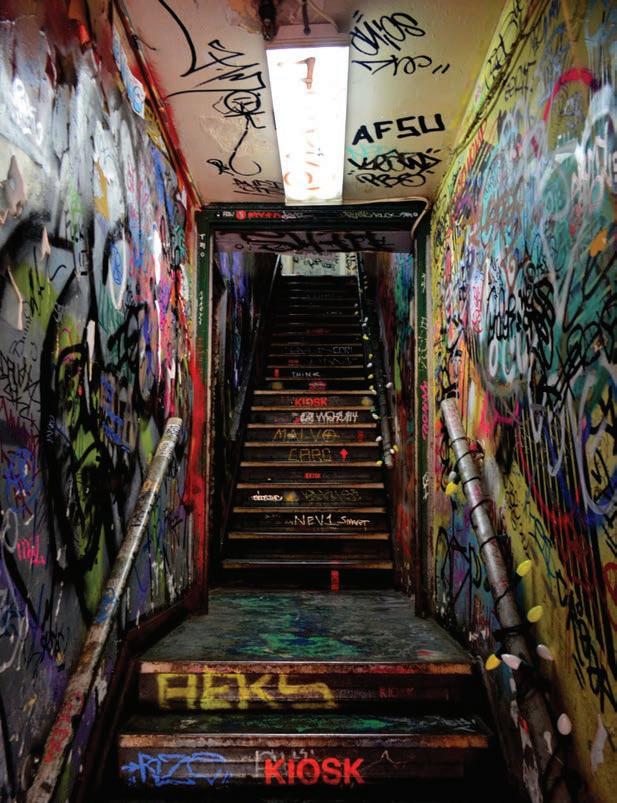
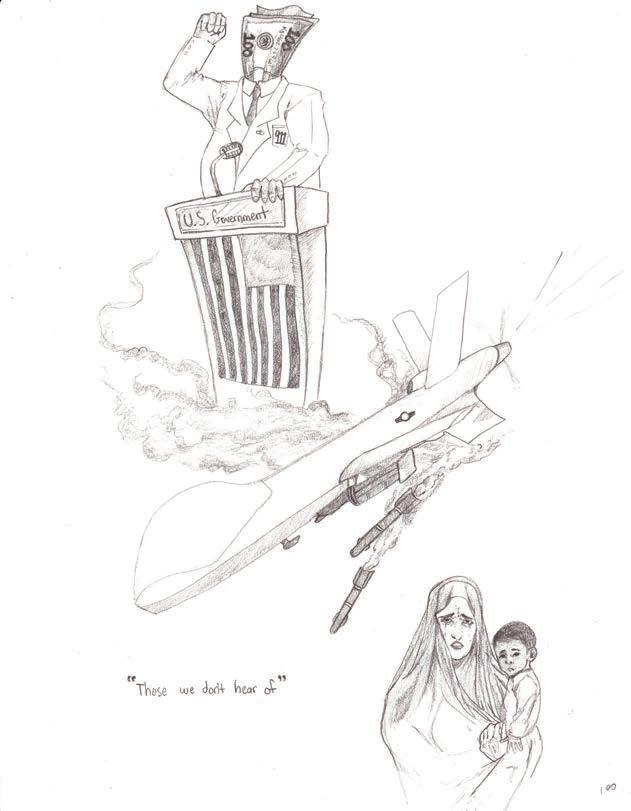
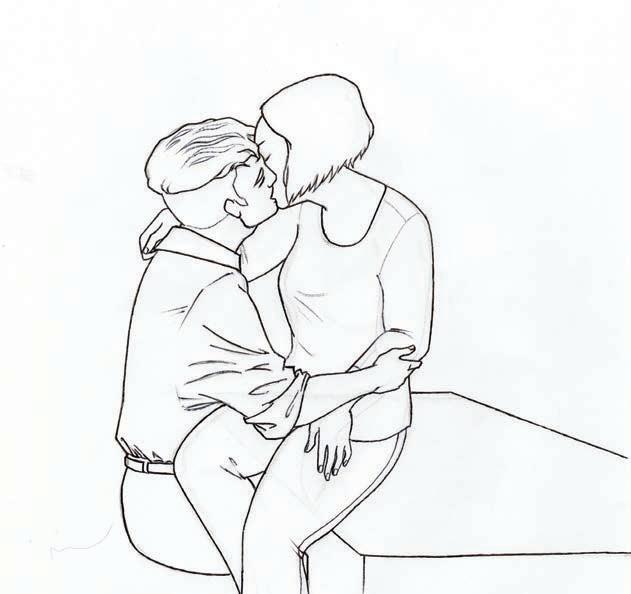
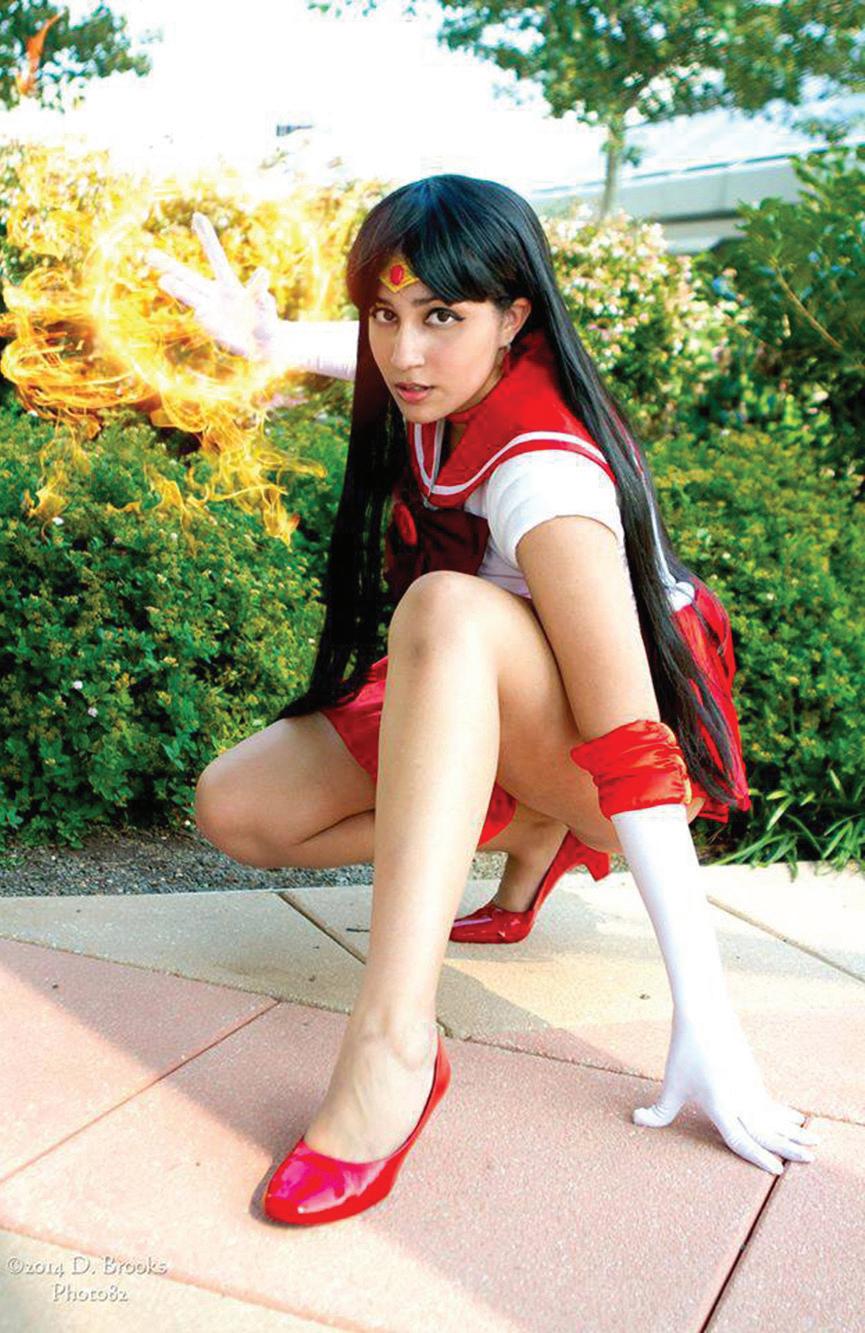
58 59
ka iley Johnson
h ro Cabrera
m er iwether k mball
Carmen luciano
ABRAHAM ANAVISCA is a pretty stellar guy, and he makes a mean burrito.
EMMA BOGAN is a writing major at NECC. She has been writing since a very young age; her other hobbies include video games, reading, and the veneration of Great Dead Cthulhu. She hopes to one day enter the publication industry as an editor, live in Boston, and perhaps spend her free time volunteering with animals.
K ATHERINE C. BROMM is a former professional photographer who is artistic in many ways. She creates incredibly detailed miniature scenes, sculpts in polymer clay, designs jewelry, and works with fiber arts. Her next goal is to be an author of poetry, picture books, and young adult fantasy novels. Katherine’s other interests include singing Disney songs with her niece and choreographing liturgical dance numbers for her Sacred Dance choir at her local Methodist church. Some call her a renaissance woman because of her many interests. Her poetry currently revolves around the special animals in her life, a small parrot called a sun conure, an energetic mixed breed dog, and a calico cat. Katherine hails from a small town in New Hampshire, but she started life on the other side of the globe. She was born in Japan when her father was based in Okinawa with the U.S. Navy during Vietnam.
SARAH COURCHESNE received her B.A. in English from UMass-Amherst, then made an abrupt swerve and studied veterinary medicine at Tufts University. She now lives in East Kingston, NH and teaches in the Natural Sciences Department at NECC. She is an essayist, a nature writer, a very occasional poet, and she, like everyone else, as they say, has one novel in her. Perhaps one day, it will out.
EMILY CURRAN is an avid photographer and digital designer. She is currently attending NECC to pursue a career in publication design. She hopes to find a wonderful living creating designs and layouts for publications either online or traditional format. She attended the New England School of Photography for her first semester of college and learned many tips and tricks that she still uses today. It taught her to love photography as more of a hobby than a career, and it guided her to where she is today. Her favorite thing to photograph is her cat, Coory, who is a beautiful eight-year-old silver-shaded Persian. Emily has dabbled in many different kinds of art including three-dimensional, two-dimensional, charcoal drawing, and traditional drawing. In her spare time, she enjoys photographing birds in her backyard, attending concerts, and spending time with her friends and family on Cape Cod.
ADAM DORGAN was born in Lynn, MA on May 3, 1981. He has been a student of the arts since high school with a focus on photography, studying independently as well as attending courses at Montserrat College of Art, Middlesex Community College, and NECC. He was featured in Parnassus for a painting in 2002, and he also had work displayed in the President’s Gallery of NECC earlier this year. The Eagle Tribune featured an article on a group project that he worked on. Adam Dorgan works and lives in Peabody, MA.
M ARY EVERETT is a Biology and English major at NECC. She has had poetry and op-ed pieces regarding sexual identity and feminism published in online and print media, alongside her photography and mixed media work. She lives in Amesbury, MA with her husband Joshua and their chinchilla, Catsby.
JESSICA FISCHER has lived in the small town of Sandown, NH all her life. She enjoys the challenges of creative writing and hopes to become a teacher. She enjoys reading and writing and hopes she will have a positive impact on those around her.
throughout the time that he’s been writing and performing poetry. Since age fourteen, he’s performed at different socially engaged performance events, including Louder Than A Bomb: Massachusetts, an annual youth poetry slam founded in 2001, in Chicago, and now the largest youth slam in the world. The ability to express and display the product of his own topics of interest, thoughts, and entertaining wordplay freely, along with the ability to creatively share experiences, (not always his own experiences) inspires him to continue writing poetry as often as he can.
PAIGE FOURNIER is a student currently enrolled in Northern Essex Community College. Her major is writing, but she’s always had a strong interest in many forms art and loves to create. This semester, she has been exploring photography and photo manipulation in her Digital Imaging class. This has given her a great opportunity to express myself artistically, and this photo is a sample of some of the images she’s produced thus far.
C ARLOS GONZALEZ (who prefers Cee) is 21 and lives in Lawrence, MA. He is an artist of all kinds but he mainly works around poetry, drawing, design, and photography. Art is his passion and his life!
Winner of multiple photography awards, NOAH GREENSTEIN, s a 19 year-old student at NECC. Majoring in the Arts, he hopes to blend his artistic and technical talents. Noah uses his digital photography skills to reflect the beauty and personality of the region. His photos often provide thoughtful views of common sites and landmarks. He is comfortable with black and white and color formats. Noah has been a regular contributor to the Tri-Town Transcript newspaper for several years with images that capture local people and popular events. Greenstein is also an actor, theatre technician, and stage manager for several area theatre programs where he is able to share his creative ideas and skills with audiences through live theatre.
GINGER HUR AJT loves to kayak in the summer, cross country ski in the winter, and write poetry all year long. She has the wonderful vocation of teaching writing and literature at NECC.
K AILEY JOHNSON is an aspiring professional artist from North Andover, MA. She is a full-time student at NECC and works part time as a server, activities assistant, and culture ambassador at Ashland Farm Assisted Living Community, which has inspired her to use her artistic talent to inspire others and change the world in a positive way.
MERIWETHER E. KIMBALL is a liberal arts student in her last semester at NECC. She has been homeschooled for most of her life and is largely self-taught in drawing, with assistance from her mother, encouragement from her father, and distraction by her three younger sisters. She also writes and hopes to eventually publish a current work-in-progress about a dog with psychic abilities. In the meantime she plans to attend Harvard Extension School with her own psychic service dog, Oswin, in tow. She lives in Plaistow.
T YLER KSYPKA is an avid reader and writer of short stories and poetry. While others prefer warm, sunny weather, Tyler is happiest in the wintertime. He aspires to one day be a well known author and to be able to have a long and fulfilling life.
K ATIE L ANGLOIS. An artist. A woman. A person. An individual dot on a map of the United States, which itself is a small mass on the planet Earth that’ll eventually hurl into the sun, causing chaos and death. She also likes donuts.
ANGELL PASCUAL FLORES is a first year college student at NECC. Halfway through his senior year in high school, he became a founding member of Guerilla Society, a spoken word team derived from a youth program called Movement City. Angell has found peace and mental clarity
C ARMEN LUCIANO is a talented individual residing in Massachusetts. The majority of her cosplays are inspired by anime and video games she is a fan of. She doesn't get inspired by what is the “now,” or popular topics, but sticks with cosplaying for her fans, including costuming
61 60 B i os
as Sailor Mars from the series “Sailor Moon.” She puts great effort into creating her final result as accurately as possible. Besides cosplaying, she has started to do photo editing, which she has done for several of her photos. Carmen edits her photographs with a skillful eye, especially when it comes to specific special effects. Carmen Luciano is an amazing cosplayer and a great photography editor.
JAMES M ACLEAN is a primarily self-taught artist who plays with many different mediums but has a strong preference for oil pastels. What James tries to accomplish with his paintings and drawings is an expression of emotion through the use of vibrant colors and distorted human forms. After high school, James held a series of odd jobs until applying to NECC.
AUTUMN M ARKEY is a student at NECC graduating in the spring of 2015. She is studying fine arts and plans to continue her education at UMass Lowell in the fall of 2015. Autumn is fascinated by visual elements and principles of design, both when they are embraced and disregarded creating endless possibilities.
GEORGE MEDLINSKAS was born as a little boy in Lawrence. He was an angelic altar boy. He survived CCHS with minimal scarring. He tricked his parents in thinking he was going to BC but at the last moment went to UMASS. He has two children, Chris and Sarah, both of whom attended UMASS. Chris started out as a Forestry Major, changed to Physics, graduated and got a job working with trees. Sarah started out as a Pre-Veterinary Major, changed to Comparative Literature, graduated and got a job working with animals. George sometimes questions the value of an education, even though he has taught for 40 years, 7 in 2nd grade, the rest at Community College, where he teaches Computer Science and Yoga. He is currently taking Digital Photography at NECC, where he is learning his camera and developing his artistic side. His hobbies include doing dishes, kayaking, and hanging out with moss.
JUSTIN MERCED: brother, writer, lover, fighter, snuffer buffer, and huckster. And an all right guy.
CLARE THOMPSON OSTRANDER teaches Basic Writing, English Composition I, and the College Success Seminar at NECC. She loves teaching and she loves writing. Clare has been writing stories since she was eleven years old, but only in the last couple of years has she tried to publish one of her stories. She's proud to have been published in Parnassus, and she's proud to have placed third in a the Spring 2013 Women on Writing Flash Fiction contest. She's also had an essay published on NPR's This I Believe website in the spring of 2014. The inspiration for her recent story, "The Manual for Waitresses Everywhere" comes from her 15 years as a waitress, a time in her life when being a writer and being a teacher seemed like impossible dreams. Her reason for writing remains her daughter, Grace, 9, who loves that her mom writes stories so early each morning.
RYAN SC ALLY is a musician who enjoys reading. He might enjoy writing, too.
K ARLILL TITONE is a spoken word poet as well as a youth speaker. He hopes to one day publish a book of poetry and travel the world motivating others. He was born in Methuen, but raised in Lawrence in the Prospect Hill area. One day he hopes to inspire the minds of others because motivation is movement.
Thought to have died during the Glorious Revolution of the Free and United States of America, JAKE WEISBERG's works have surfaced throughout the Age. The first such occurrence was a chest stuffed with half-finished, poorly-scribbled poems and fictions and manifestos. The complete cache was recently sold at auction for an astounding 1.2 million dollars. Over the years, his works have made their way to highest orders of the occult and down into the depths of the Black Market World of Art. It is rumored that a genuine Weisberg poem sells for about the price of a human kidney. Today, his works appear spontaneously, always presented in an unmarked manila folder in the same and undisclosed locker at Grand Central Station.
Submissions to Parnassus are limited to NECC students, staff, and faculty, with two deadlines per year. We accept submissions in the areas of art, photography, fiction, poetry, and creative non fiction. We want the best, and we know you've got it. Entries are reviewed and chosen democratically each semester by the staff and faculty advisor. Deadlines are announced online and around campus, and Parnassus is published at the end of each spring, sometimes during the summer, and occasionally at the beginning of fall. Creative people are like that sometimes. Full information on how to submit your potentially famous work can be found within our oh-so-accessible website:
We look forward to reading and viewing what you send us! Any questions or comments are encouraged — please send them along to faculty advisor Patrick Lochelt: plochelt@necc.mass.edu
Many thanks as always to all of our supporters, submitters, and readers for another great year. We couldn’t do this without you!
62
63
E M ILY C U RRAN N O AH G R EENSTEIN J A MES M A C L E AN FAD IA M AR IE J OSE PH M E LI E T HAN M E LONAS J A EDLYN P ER EZ R A CHEL T O RRES J A KE W EI SBERG S U SAN STEHFEST GR APHIC DESIGNER PATRICK LOCHELT FACULTY ADVISOR how to Co Ntri B ute par Nassus staff www.par N assuslitmag.or g
www.Parnassuslitmag.org



